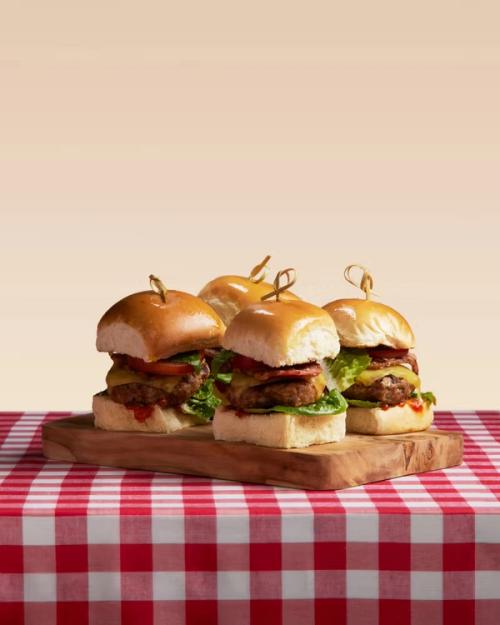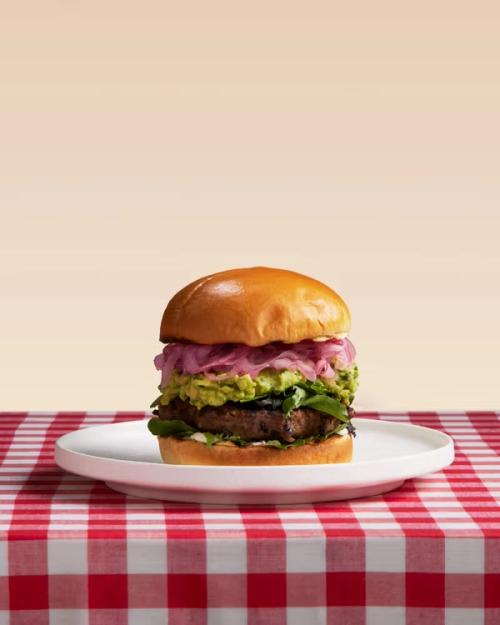Learn
Nutrition Your Questions: Do burgers have a place in a healthy diet? We ask New Zealand nutrition expertsYour Questions: Do burgers have a place in a healthy diet? We ask New Zealand nutrition experts
The humble homemade burger. Unashamedly a favourite for many of us, because let’s face it, you can tailor it to suit you and your tastebuds. Whether you live in a large or smaller household, serving up burgers means everyone can create them with the fillings they like, and no one is disappointed.
If it’s such a favourite, does having homemade burgers weekly as Burger Thursday suggests tick the boxes when it comes to wholesome, nutritious tucker? We asked some New Zealand Registered Nutritionists and Dietitians their thoughts.


Do Burgers have a place in a healthy diet?
Conrad Goodhew, Accredited Sports Dietitian
"Absolutely, I am a big fan of burgers both personally and professionally. Don’t get me wrong they are not something we want to have every day (or multiple times per week), but I would pick a burger over other (what you could consider as) health foods – such as sushi. Why? Because they contain carbohydrates, a great source of protein, and some vegetables."
Nikki Hart, Registered Nutritionist
"Burgers are a much-maligned food because of their link to the fast-food industry. Traditionally a burger is made using higher fat meat made into a patty and then placed in a low/no fibre white bun with the addition of cheese and sugar-laden condiments.
However, I think "make-your-own burger" night at home is a great way to improve the profile of this popular food and show children that it can be part of a healthy diet with the addition of colourful vegetables."
Amanda Brien, Registered Nutritionist
"All foods have a place in a healthy diet, it’s all about how often you have them and how they’re prepared. Making burgers at home can be a great way of getting kids involved with cooking in helping to make the patties by measuring ingredients or getting their hands dirty mixing all of them together. Burgers are a great way of adding some more vegetables or fruit (pineapple slices - yum!) to your day with fillings and sides - lettuce, tomato, beetroot, cucumber, carrot, bean sprouts, capsicum…. the list could go on."
Angela Berrill, NZ Registered Dietitian
"Absolutely! Healthy eating is flexible and has room for all foods, burgers included. Homemade burgers are made up of nutritious foods after all - meat, vegetables, and a bun!"
What are your tips and tricks for making a burger?
Conrad Goodhew, Accredited Sports Dietitian:
"It really depends on what you are doing. I am a big fan of utilising the plate model to help determine your composition. The burger itself will give you carbs, protein, and some veg. More often than not the veg portion will be a bit light, so don’t be afraid to add on a side of vegetables of your choice. If they are homemade don’t be afraid to grate carrot and onion to fill out the patty itself – not only does it add volume to the patty but also keeps it very moist.
As a fun fact, I refuse to eat salad in my beef burger. I will flip the lid, eat the salad then have the burger as a cheese and beef. Something I have done as long as I can remember."
Nikki Hart, Registered Nutritionist:
"I like combining animal and vegetable sources of protein when making burger patties - this not only helps to stretch the amount of mince to feed more hungry mouths but boosts the fibre content of the burger. I like to also use the leanest premium mince to reduce the overall saturated fat content of the patty.
I keep it relatively simple for children but add chopped jalapeño peppers to the adult ones to give them a bit of fire. I like to put out bowls of things to add so people can build their own versions - shredded iceberg lettuce and baby spinach for crunch and colour, chopped coriander, sliced tomatoes, beetroot slices, pineapple rings, sometimes fried onion rings, hummus - it's all about what flavours and colours you want on your own burger.
I use grated rather than sliced cheese as this means you use less cheese which can also help lower the fat content of the burger. You can use wholegrain buns rather than the traditional white ones to boost fibre as another way to lift the healthiness profile of the burger."
Amanda Brien, Registered Nutritionist:
"Always include some vegetables for your fillings. They provide colour, flavour, texture, and nutrients - some of which can help iron absorption from your beef or lamb patties and other ingredients, through their vitamin C content, think capsicum, tomato, and kumara."
Angela Berrill, NZ Registered Dietitian:
"When making homemade burgers you can bump up the nutritional value by using a wholegrain bun and making your own burger patties. Use lean mince and add in plenty of your favourite grated veges into the mix. I personally like adding in grated onion, mushrooms, carrot, and courgette. Grating the vegetables not only helps from a texture and ease of cooking perspective, but it is an easy way to add in veges, if your kids aren’t too keen on a salad! You can also add some canned legumes (drained) to the mince patty mix as well.
When it comes to assembling your burger, have a selection of lots of tasty salad ingredients available and let everyone build their own. The more salad the better! Enjoy."
The



Posted by Beef + Lamb New Zealand








